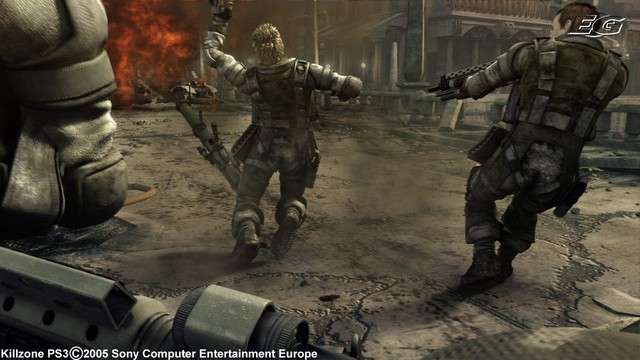Editorial: MS and Sony fight for your money
But how much of it?
It looks like Xbox 360 is going to cost less than PlayStation 3. No big surprise there, then, especially if you've been following the news this week.
But while many commentators have lambasted Microsoft post-E3 for cutting corners in order to undercut the competition on price (making the wireless network component optional, for example), cracks in Sony's offering are starting to appear - with Chief Technology Officer Masayuki Chatani admitting in the latest edition of Japanese Famitsu magazine that the hard disk could well be sold separately.
Unlike Nintendo Revolution, Sony PlayStation 3 does not feature any onboard flash memory storage, so the lack of a hard disk in the retail package would mean that, much as with the current-generation PlayStation 2, consumers were expected to pay for the console and buy save game and other storage media separately. Sony has yet to make a final decision on the hard disk issue.
Elsewhere, Microsoft's J Allard this week told TheStreet.com that Xbox 360 would cost around US$300. While Xbox 360's 20GB hard disk is detachable and upgradeable in the same way Sony's equivalent PS3 peripheral will be, it's almost certain to be bundled with the hardware at launch.
Given that Sony's Ken Kutaragi virtually admitted this week that PlayStation 3 would cost more than Xbox 360 (telling Asahi Shinbun, "It isn't a bad thing to have a high price," as part of a broadside against his main competitor), the added cost of essential peripherals could well be decisive.
Console hardware pricing is always a contentious issue. Launch prices are hotly debated, price drops are engineered to try and cut competitors as deeply as possible, and retailers often seek to increase their returns by bundling high-margin items and hiding vanilla console packages away from view.

As the potential difference in price between Xbox 360 and PlayStation 3 looks to widen - with no firm rebuttal likely until both companies have cemented their plans - one has to ask: at one point does the difference in price negate the argument, which has been echoing around the Internet for nearly two weeks, that one console is "better" than the other based purely on specs and game commitments?
To extend upon Ken Kutaragi's comments elsewhere in Asahi Shinbun this week - a BMW with a Ferrari engine is bound to be superior to the average family car in a great many ways, but will the average user see as much value in it as somebody with £200,000 to burn if it still gets them from A to B? Or, in this case, still provides solid entertainment and a significant gain over past machines?
It would be unfair to cite the PSX, Sony's amalgamated PS2 and home media centre that sold rather poorly in Japan at a very high price, to back up this line of argument, but the current train of thought does leave the name ringing in the ears a touch.
Reaction after E3 seemed to fall largely on Sony's side, with many backing its PS3 offering over Microsoft's Xbox 360, but just as many commentators said they felt the lower-priced, lower-specced Nintendo Revolution was a viable console because it aimed for a niche neither Sony or Microsoft were considering, perhaps when the pricing situation becomes clear people will be forced to stop comparing Xbox 360 directly to PS3.

The argument that PlayStation 3 outperformed Xbox 360 in Los Angeles is still valid - whatever your interpretation of the word "performance" might be. And it's easy to see sense in Kutaragi insistence this week that PS3 can beat Xbox 360 in the same way PlayStation conquered Super Famicom/Nintendo in the mid-90s, despite launching much later with a dramatically larger price point - particularly when you compare the relative installed bases and reputations of the companies involved then and now.
But if PlayStation 3 is substantially more expensive than Xbox 360, for whatever reason, it's entirely possible that we'll start to see some sense in what J Allard was saying at E3 about the importance of graphics, and what Robbie Bach was suggesting in the same Japanese newspaper article that Kutaragi spoke in recently: that PlayStation 3 might be going a bit too far for its own good.
Bach reckons Microsoft "will become the market leader" with Xbox 360. Kutaragi reckons Microsoft is "not a threat". The truth is, as it has been all along, that there's only one person who can decide the contest, and that's the consumer. And if the consumer can't afford a Ferrari, why not buy the suped-up family car instead?

